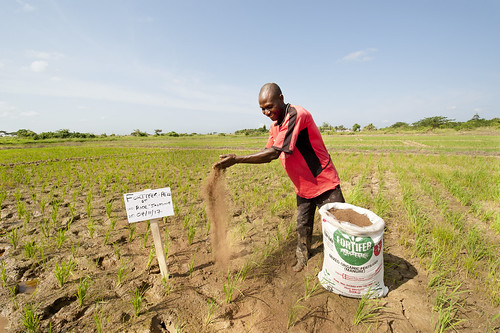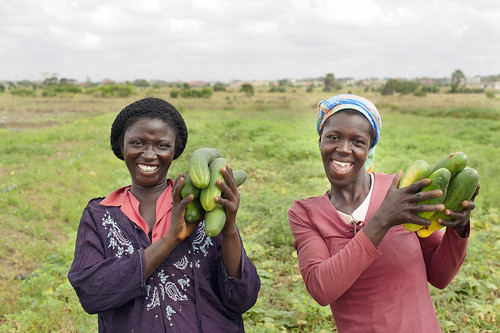West Africa is the poorest region on the continent. Heavily dependent on subsistence agriculture, the region is plagued
by low levels of productivity and food insecurity stands at nearly 50%. Massive migration from rural to urban areas is currently underway – particularly involving young men – and it is expected that 63% of West Africans will live in cities by 2050. Rapid urban expansion has left cities with inadequate infrastructure and sanitation services, causing land degradation and water pollution. It has also given rise to an increasing ‘feminization’ of agriculture, which is complicated by persistent inequity in women’s access to and control of productive assets. The region is highly vulnerable to climate change. Increasing temperatures, accompanied by erratic rainfall and prolonged dry spells and floods, are likely to reduce crop yields with serious implications for food security at a time of significant population growth: West Africa’s population of
over 400 million is set to
more than double by 2050.
Most farmers in West Africa are smallholders who rely on rain-fed agriculture to satisfy their basic food needs. Irrigation policies and initiatives in the region tend to target large-scale production. As a result, smallholders lack access to technologies, finance and knowledge about water management. By ensuring that water is used more efficiently, IWMI supports sustainable agricultural intensification and the increased resilience of farming systems. Together with our partners, we design, test and scale low-cost approaches to integrated water resources management that support social equity, economic efficiency and environmental sustainability. By developing and evaluating solutions that save and conserve water, IWMI contributes to making small- and large-scale irrigation development more efficient, profitable and resilient. We use geospatial analysis and develop business models to demonstrate the potential benefits of solar irrigation for smallholders in off-grid rural areas. Flood and drought monitoring systems developed by IWMI are used by governments to implement long-term resilience measures and respond to emergencies. We advise policy makers and participate in stakeholder dialogues with the goal of establishing institutional and financial arrangements for a resilient and sustainable agriculture sector.
With plans underway to combat the impacts of climate change in West Africa, farmers are learning to adapt to shorter agricultural seasons and longer and more frequent dry spells, as well as increasing rainfall intensity, which damages crops and causes more frequent flash floods. IWMI is helping by providing farmers in the region with climate-smart water solutions, promoting insurance packages for floods and droughts, and fostering the establishment of climate-resistant water storage facilities. We quantify the projected impacts of climate change on water resources to inform national climate change mitigation and adaptation plans. IWMI’s drought and flood risk mapping tools help governments to identify areas requiring relief aid or long-term mitigation measures. We assess the technical, economic, social, financial and institutional impediments to expanding agricultural water infrastructure, and use hydrological models and climate scenario analyses to support policy making and investment decisions to overcome these barriers.
In transboundary river basins, conflicts may arise between countries over the distribution, use and management of scarce water resources. West Africa has 22 major transboundary river basins; all countries except Cape Verde share at least one river with another country. IWMI provides water accounting tools to enable objective decision-making on water allocation by government agencies. We also support transboundary water management through capacity building as a means to optimize basin-wide benefits and provide options for benefit-sharing across countries.
Despite the fact that West Africa has experienced intense urbanization over the past five decades, there has been little effort to understand how rural-urban interactions affect the livelihoods of low-income and vulnerable groups in both settings. Such interactions include, for example, the movement of people, goods, money, information and waste between cities and rural areas, and the links between agriculture, services and other sectors. Recognizing these links could help boost food security in West Africa, where smallholder agricultural productivity is low and access to markets is limited.
IWMI is examining rural-urban linkages, migration and inclusive development to support policy formulation for the effective governance of shared natural resources. This includes establishing arrangements for water resources management, and ensuring that both women and men have equitable access to adequate water supplies to support livelihood development. IWMI works with women and young entrepreneurs to strengthen their resilience and ability to adapt to climate change, natural disasters and socioeconomic challenges. We also facilitate multi-stakeholder dialogues on social transformation planning to improve inclusive rural and urban growth.
In West Africa, people usually depend on pit latrines or septic tanks to dispose of human waste, which is then leaked or discharged as ‘fecal sludge’ into the environment. The resulting contamination of water and food supplies has serious health impacts. Progress toward increasing access to improved sanitation facilities has been very limited in the region.
IWMI has decades of experience in using waste and wastewater to support sustainable growth and a circular economy based on the concepts of reuse and recycling. Our pioneering research on the sanitation value chain revealed a demand for waste-derived products, which prompted the development of technologies to recover wastewater for new uses. We have initiated public-private partnerships that have resulted in robust businesses that commercialize waste-based products developed by IWMI. Based on our research, the Government of Ghana added waste-based composts to its fertilizer subsidy program. We work with public and private sector partners, particularly in Ghana, to understand the health risks of using contaminated water for irrigating crops, and to determine the best approaches to mitigate these risks. IWMI developed methods for rearing fish in treated wastewater ponds, and carried out public awareness and social marketing campaigns around food safety. We successfully developed and tested an organic fertilizer from fecal sludge and market waste. We are testing the sustainability of these innovations, and developing tool kits and capacity building programs for scaling in communities and countries throughout the region. We will continue to assess water quality and pollution pathways, and recommend control measures for mitigating human and environmental health risks.












